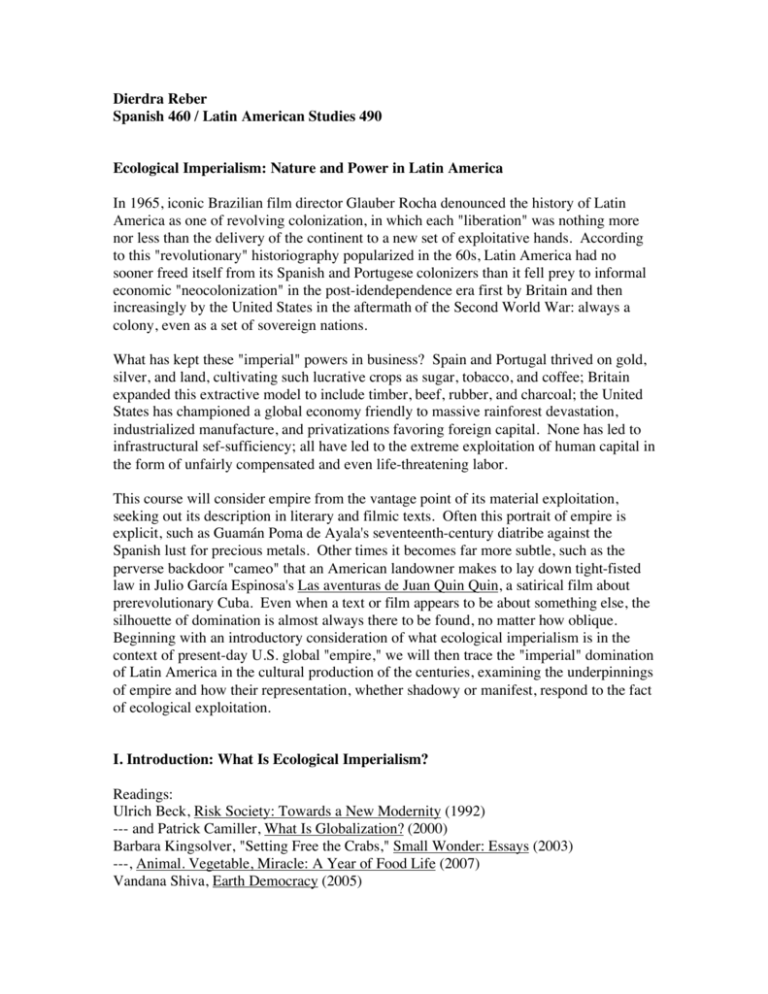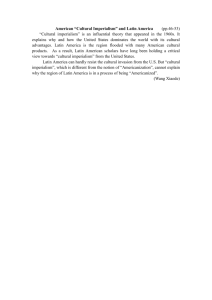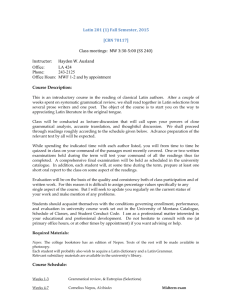Ecological Imperialism: Nature and Power in Latin America
advertisement

Dierdra Reber Spanish 460 / Latin American Studies 490 Ecological Imperialism: Nature and Power in Latin America In 1965, iconic Brazilian film director Glauber Rocha denounced the history of Latin America as one of revolving colonization, in which each "liberation" was nothing more nor less than the delivery of the continent to a new set of exploitative hands. According to this "revolutionary" historiography popularized in the 60s, Latin America had no sooner freed itself from its Spanish and Portugese colonizers than it fell prey to informal economic "neocolonization" in the post-idendependence era first by Britain and then increasingly by the United States in the aftermath of the Second World War: always a colony, even as a set of sovereign nations. What has kept these "imperial" powers in business? Spain and Portugal thrived on gold, silver, and land, cultivating such lucrative crops as sugar, tobacco, and coffee; Britain expanded this extractive model to include timber, beef, rubber, and charcoal; the United States has championed a global economy friendly to massive rainforest devastation, industrialized manufacture, and privatizations favoring foreign capital. None has led to infrastructural sef-sufficiency; all have led to the extreme exploitation of human capital in the form of unfairly compensated and even life-threatening labor. This course will consider empire from the vantage point of its material exploitation, seeking out its description in literary and filmic texts. Often this portrait of empire is explicit, such as Guamán Poma de Ayala's seventeenth-century diatribe against the Spanish lust for precious metals. Other times it becomes far more subtle, such as the perverse backdoor "cameo" that an American landowner makes to lay down tight-fisted law in Julio García Espinosa's Las aventuras de Juan Quin Quin, a satirical film about prerevolutionary Cuba. Even when a text or film appears to be about something else, the silhouette of domination is almost always there to be found, no matter how oblique. Beginning with an introductory consideration of what ecological imperialism is in the context of present-day U.S. global "empire," we will then trace the "imperial" domination of Latin America in the cultural production of the centuries, examining the underpinnings of empire and how their representation, whether shadowy or manifest, respond to the fact of ecological exploitation. I. Introduction: What Is Ecological Imperialism? Readings: Ulrich Beck, Risk Society: Towards a New Modernity (1992) --- and Patrick Camiller, What Is Globalization? (2000) Barbara Kingsolver, "Setting Free the Crabs," Small Wonder: Essays (2003) ---, Animal. Vegetable, Miracle: A Year of Food Life (2007) Vandana Shiva, Earth Democracy (2005) Joel Bakan, The Corporation: The Pathological Pursuit of Profit and Power (2005) Film: Jennifer Abbott and Mark Achbar, The Corporation (2003) II. The Spanish Empire in the New World: The Exploitation of Land, Mines, and Labor Readings: Cristóbal Colón, Diarios de viaje (1492) Fray Bartolomé de las Casas, Brevísima relación de la destrucción de las Indias (1542) Guamán Poma de Ayala, Nueva corónica y buen gobierno (1615) Ralph Bauer, "'EnCountering' Colonial Latin American Indian Chronicles: Felipe Guaman Poma de Ayala's History of the 'New' World," American Indian Quarterly 25.2 (Spring 2001): 274-312 César Aira, Argentina, las grandes estancias (1995) Film: Kief Davidson and Richard Lakani, The Devil's Miner (2006) III. Independence: Courting European Commerce, Celebrating Creole Sovereignty Readings: Simón Bolívar, "Carta a Jamaica" (1815) Sarmiento, Facundo (ch.1) (1845) Andrés Bello, "Silva a la agricultura de la zona tórrida" (1826) IV. Informal British Colonialism in Latin America and Incipient U.S. Hemispheric Hegemony Readings: Rubén Darío, "A Roosevelt" (1902), "Los cisnes" (1902) Horacio Quiroga, "Los mensú," Cuentos de amor, delocura y de muerte (1914), "Anaconda" (1921) José Eustacio Rivera, La vorágine (1924) Rómulo Gallegos, Doña Bárbara (1925) Rosario Ferré, Maldito amor (1985) Louis A. Pérez, Jr., On Becoming Cuban: Identity, Nationality, and Culture (2001) Jennifer L. French, Nature, Neo-Colonialism, and the Spanish American Regional Writers (introduction) (2005) Films: Mario Soffici, Kilómetro 111 (1938) Fernando "Pino" Solanas, Memoria del saqueo (2005) V. Revolutionary Movements of the 1960s and Nuevo Cine Latinoamericano Readings: Glauber Rocha, "La estética del hambre" (1965) Julio García Espinosa, "Por un cine imperfecto" (1967) Ernesto "Che" Guevara, "Mensaje a los pueblos del mundo a través de la Tricontinental" (1967) Fernando Solanas and Octavio Getino, "Hacia un tercer cine" (1969) Films: Glauber Rocha, Terra em transe (1965) Fernando "Pino" Solanas and Octavio Getino, La hora de los hornos (1968) Tomás Gutiérrez Alea, Memorias del subdesarrollo (1968) Julio García Espinosa, Las aventuras de Juan Quin Quin (1969) VI. Globalization, Neoliberalism, and U.S. Economic "Imperialism" Readings: Slavoj Zizek, "Welcome to the Desert of the Real" (2001) Diamela Eltit, Mano de obra [Work Hand] (2003) Oscar Olivera and Tom Lewis, ¡Cochabamba! Water War in Bolivia (2005) Greg Grandin, Empire's Workshop: Latin America, the United States, and the Rise of the New Imperialism (2006) Aleida Guevara, Chávez, Venezuela, and the New Latin America (2005) Richard Tucker, "Environmentally Damaging Consumption: The Impact of American Markets on Tropical Ecosystems in the Twentieth Century," Confronting Consumption, Ed. Thomas Pincen, Michael Massiates, Ken Conca (Cambridge; London: MIT, 2005): 177-95 "Still No. 1," The Economist (June 30, 2007): 11-12 Films: Fernando "Pino" Solanas, La nube [Cloud] (1998) ---, La dignidad de los nadies (2005) Walter Salles, Diarios de motocicleta [The Motorcycle Diaries] (2004) Nigel Noble, Os carvoeiros [The Charcoal People] (2005)








